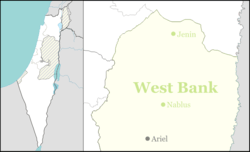Argaman
| Argaman Hebrew: אַרְגָּמָן | |
|---|---|
 Argaman | |
| Coordinates: 32°10′20.99″N 35°31′18.84″E / 32.1724972°N 35.5219000°ECoordinates: 32°10′20.99″N 35°31′18.84″E / 32.1724972°N 35.5219000°E | |
| Council | Bik'at HaYarden |
| Region | Jordan Valley |
| Affiliation | Mishkei Herut Beitar |
| Founded | 1968 |
| Founded by | Nahal |
| Population (2015)[1] | 133 |
| Name meaning | Crimson |
Argaman (Hebrew: אַרְגָּמָן, lit. Crimson) is a moshav and Israeli settlement in the West Bank. Located in the Jordan Valley,[2] eight kilometres north of the Damia Bridge with an area of 4,500 dunams, it falls under the jurisdiction of Bik'at HaYarden Regional Council. In 2015 its population was 133.
The international community considers Israeli settlements in the West Bank illegal under international law, but the Israeli government disputes this.[3]
Etymology
The moshav's name is an acronym for Arik Regev and Gad Manela, two Nahal commanders who were killed there in a clash with Arab militants.[4]
History
Initially established in 1968 as a Nahal settlement by the Betar movement,[5][6] Argaman was converted to a civilian moshav in May 1971.[7] Prior to the establishment of Argaman, Moshe Dayan, then Israeli Minister of Defense, was opposed to the installment of settlements in the center of the Jordan Rift Valley as it would show too explicitly that the Palestinian Arabs of the West Bank were being separated from the Arabs east of the Jordan River.[8]
References
- ↑ "List of localities, in Alphabetical order" (PDF). Israel Central Bureau of Statistics. Retrieved 16 October 2016.
- ↑ http://www.jordanvalley.org.il/page_49202
- ↑ "The Geneva Convention". BBC News. 10 December 2009. Retrieved 27 November 2010.
- ↑ The Israel digest, Volume 12
- ↑ Gordon, Neve (2008), Israel's Occupation, University of California Press, p. 123, ISBN 9780520255319
- ↑ Efrat, Elisha (1988), Geography and Politics in Israel Since 1967, Psychology Press, p. 33, ISBN 9780714633039
- ↑ The colonization of the West Bank territories by Israel: hearings before the Subcommittee on Immigration and Naturalization of the Committee on the Judiciary, United States Senate, Ninety-fifth Congress (PDF), October 1977, p. 61
- ↑ Gorenberg, Gershom (2007), The Accidental Empire: Israel And the Birth of the Settlements, 1967-1977, Macmillan, p. 142, ISBN 9780805082418